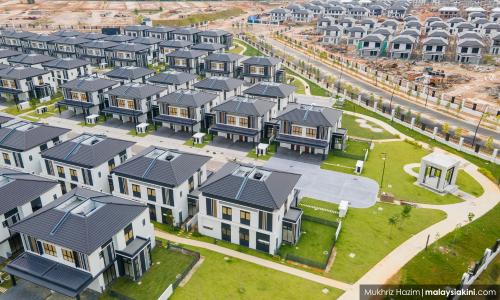LETTER | Addressing HBA concerns on e-SPA
LETTER | We refer to the article by Chang Kim Loong of the National House Buyers Association (HBA) under the heading “Baffled over eSPA” dated June 10, 2022, in the Edge Property.
The article indirectly raises questions about HBA's direction and objective. It raises questions and doubts about a system that benefits purchasers and the housing industry and appears to speak in defence of the legal fraternity.
Victims Malaysia (VM) had hoped that HBA supports the Housing and Local Government Ministry (KPKT) initiative as it benefits the purchasers and stimulates the current gloomy housing industry.
In a nutshell, e-SPA is an electronic contract platform created by KPKT where the sale and purchase agreements (SPA) between developers and purchasers are done on an electronic platform.
The contract content essentially remains unchanged as per the existing schedule in HDA118. It is not extended beyond the limits of HDA118 to cover sub-sales.
If previously we use pen and paper to write and then the typewriter came along followed by MS Office, the e-SPA is just another evolutionary step in writing and documentation. It benefits the purchaser as it reduces the total cost of owning a house.
For clarity, the existing contract and the e-SPA are the same. It is statutory as it is part and parcel of the HDA118 which means it cannot be amended by both purchasers or developers or their legal representatives. Both buyers and developers cannot develop any supplementary agreement to the SPA as it can be nullified easily in court.
As the agreement is statutory, lawyers no longer need to draft, evaluate and structure the terms of a contract for the best benefit of their clients. Therefore, the point highlighted that lawyers providing the necessary check and balance as claimed in the article is not qualified.
This essentially raises questions on the value that lawyers provide to the purchasers in formalising the contractual relationship between parties. In fairness, the exorbitant cost imposed does not justify the standard administrative work with very little legal value.
The work can be done by anyone with some degree of knowledge. In the real world, purchasers' legal services are almost unheard of after the SPA has been formalised.
Malaysian laws do not prevent two or more parties from signing any agreement without legal representation. Self-representation is a norm in any contract and is even practised in courts.
Any agreement must be stamped by the stamp office to make it legally enforceable. This can be done by runners or self-service and it only costs the buyer an RM10 of stamping fee.
Irrespective of the form of the agreement (paper or electronic), the government is never a party to the SPA. The government’s position is and has been that SPAs are private matters between developers and purchasers.
It created a standard SPA for the good of the industry. The government's role is to ensure that all parties comply with the HDA118. This does not change with the introduction of e-SPA.
The positive aspect of e-SPA must not be ignored. It will stimulate the housing industry as it reduces the total cost of property ownership. Essentially it formalises the existing marketing practices by developers where they provide a “free legal fees” package in their offerings at a low cost to everyone.
The concerns of MOT attestation raised in the write-up do not arise. In Section 211 (Fifth Schedule) of the National Land Code, 1965 (revised 2020) a list of several other persons that can do the attestation is provided.

Role of the ministry
One must not be confused with MOT (Form 14A) attestation and the SPAs as these are two separate documentation. In the housing industry, developer lawyers can easily provide these services.
The role of KPKT has been towards ensuring a sustainable, housing industry and this includes ensuring that developers have enough funds to complete their projects.
With the proposed revision of the HDA118, VM has given lots of input to further enhance purchasers' interest with minimal impact on the developers to ensure that Malaysia has a sustainable and vibrant housing industry that would be attractive to the local and foreign buyers.
The objective is to ensure the consumer can buy houses with confidence with minimal downside risk.
With or without e-SPA, the developer is duty-bound to provide purchasers' information to the regulator either voluntarily or via a court order.
Under e-SPA, this process is now being streamlined where the Housing Controller would have ready access to the information when it requires them and to use the information for the benefit of the industry.
In the write-up, HBA has compared the information collated under e-SPA with MySJ in an attempt to link the issues surrounding MySJ with e-SPA. This is nothing short of being irresponsible.
The question of tracking purchasers does not arise as the data has little value once the project is completed and the developer has discharged its liability. The data has no long-term value to anyone other than to the government as they can use it for analysis to develop new policies.
Collating and tracking sub-sales information naturally does not arise as it is outside the scope of the HDA118. The government including KPKT collects so much data on Malaysian on daily basis and they have to ensure that data breaches do not arise.
This is not something new. Data management and data securities are part and parcel of the responsibility of holding data and all data holders are subjected to the PDPA law.
HBA has raised a valid point with regard to the government changing the terms of SPA and this matter has been decided by the Federal Court as illegal.
VM has raised its objection to amending the relevant section to empower the controller to change the terms of SPAs and will stand in solidarity with HBA. This should not be allowed to happen. However, we must be clear that this is a separate issue towards the evolution of e-SPA.
The legal fraternity's concerns about the impact of e-SPA on their business are understandable as they are about to lose the goose that lay the golden egg. However, one must appreciate that the cost imposed by the lawyers is exorbitant compared to the value and services provided.
In conclusion, e-SPA will help to spur the sluggish housing industry. It creates value for the entire ecosystem. Purchasers will benefit from the legal cost reduction and it will also help the regulator in policy development.
The legal fraternity equally needs to evolve and find a value-added business for its clientele.
The writer is the chairperson of Victims Malaysia.
The views expressed here are those of the author/contributor and do not necessarily represent the views of Malaysiakini.
RM12.50 / month
- Unlimited access to award-winning journalism
- Comment and share your opinions on all our articles
- Gift interesting stories to your friends
- Tax deductable
